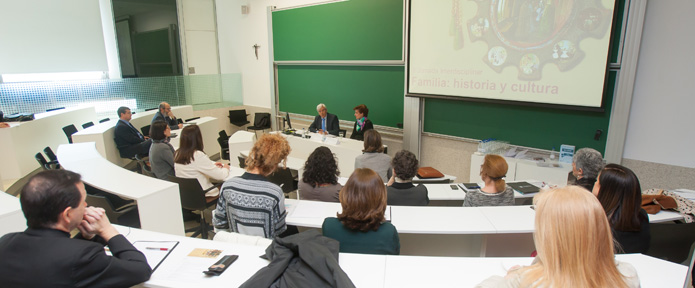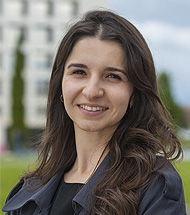The family through history and culture
The Institute for Culture and Society coordinated the II interdisciplinary workshop on the family with experts from Schools of Law, Economics and Philosophy and Letters.

The University of Navarra hosted the II Interdisciplinary Family workshop , 'Family: History and Culture', with the goal to give continuity to the dialogue initiated in the previous edition, 'Family and Society in the 21st Century', and to provide a space where researchers, from the University and other universities, could delve into questions about the family from different areas of knowledge. At the initiative of Office of the Vice President for Research, the Institute for Culture and Society was in charge of coordinating the event in which, from a historical and interdisciplinary perspective, the role of the family was analyzed both in social organization and in the life of each individual.
Among the speakers were researchers from the Schools of Philosophy and Letters, Law and Economics of the University of Navarra. In addition, the workshop counted with the intervention of María Antonia Bel Bravo, professor of Modern History at the University of Jaén.
History, Art and LiteratureAfter a brief presentation by Javier Escrivá, director of high school of Family Sciences and Master's Degree in Marriage and Family of the University of Navarra, the first discussion paper, 'Illegitimate children of royalty, family or disinherited?', was given by Julia Pavón, professor of Medieval History. The expert used several examples of the Navarrese medieval nobility to approach the role of illegitimate children within the structure of the nuclear family.
Professor María Antonia Bel Bravo, from the University of Jaén, gave the lecture lecture 'The family in the Modern Age as a factor of social stability'. The researcher referred to several authors of the modern era to show the work of first Education of the principles governing the established order and 'socialization' that the family fulfills.
For his part, Juan Manuel Escudero, Full Professor of Spanish Literature, addressed 'Family relationships as a dramatic engine in the theater of Calderón de la Barca'. Escudero reflected on the family and its internal relationships as a fundamental driving force in Calderón de la Barca's secular plays. In the case of Calderón's tragedy, he explained that it is one of the fundamental pillars of conflict and, as for the universe of comedy, the family is used as an enhancer of entanglement.
The next speaker was Ricardo Piñero Moral, Full Professor of Aesthetics and Theory of the Arts, with the presentation 'Art and family: in search of a masterpiece'. The researcher referred to the categories Natural, Universal and Fundamental and explained their application in the family, as a human institution, as well as in art, as a peculiar action specific to human beings.
The morning concluded with an intense colloquium moderated by Madalena D'Oliveira-Martins, researcher of the project ' 'Emotional culture and identity' of the Institute for Culture and Society and member of the committee organizer of the workshop.
Law and the common goodThe workshop continued in the afternoon with Mercedes Vázquez de Prada, professor of Contemporary History, who spoke on 'Children's rights and their impact on the family: a challenge for today's society'. In her discussion paper she recalled the importance of children as the future of society and the need to recognize their right to a stable development in the domestic and family environment as well as their social value by the political powers.
Javier Nanclares, Senior Associate Professor of Civil Law, presented 'The family in contemporary law'. In his exhibition he stated that the current family model is far from being identified with the family based on marriage due to the evolution of national legislations and international texts in recent decades. In addition, the expert reflected on the purely cultural vision of marriage, family and filiation.
position The last discussion paper of the workshop was 'The family as business of human and social capital, what is the role of the family in the society of knowledge?' and was given by Antonio Moreno, Senior Associate Professor of Economic History. Faced with the growing vision of a family with 'no relevant role' in society, reduced to the world of personal affections and totally disconnected from the common good, Moreno tried to show the role played by the family in the society of knowledge and to exemplify its connection with the common good.
At the end, there was a colloquium moderated by Inma Alva, collaborator of research of the Documentation Center and programs of study José María Escrivá de Balaguer and member of the committee organizer of the workshop.


